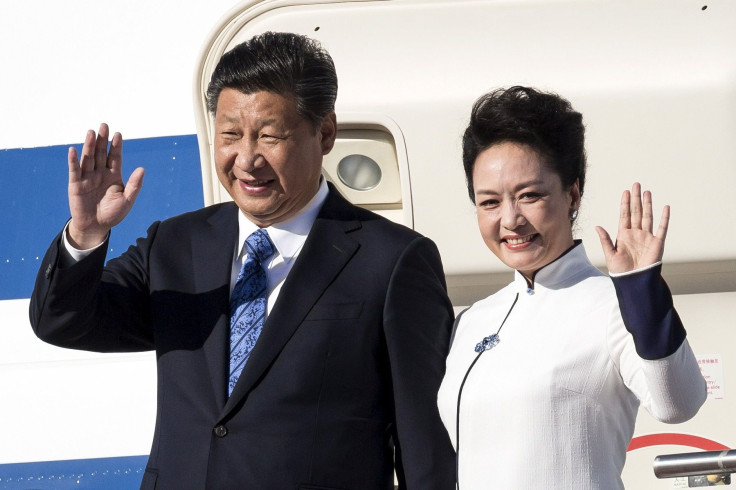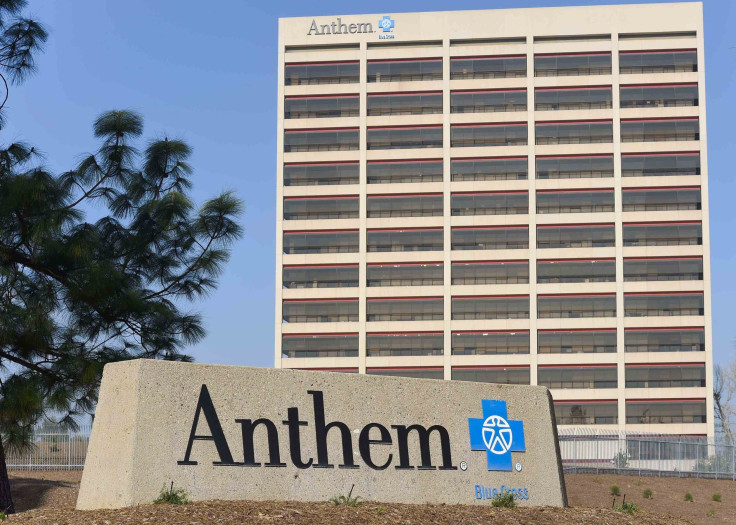China's Xi Begins US Visit Amid Concerns Over Hacking, Investment And South China Sea Islands

SHANGHAI -- The Chinese media did its best to put a positive spin on President Xi Jinping’s first state visit to the United States, ahead of his arrival in Seattle on Tuesday, with the official People’s Daily newspaper stressing that “negotiations on many key sectors are close to a successful outcome.” It added that the two countries are “likely to seal more than 40 agreements and deals, including a major one on climate change.”
Yet the positive mood of last year’s summit in Beijing, which led to a landmark climate change accord, has evolved to one of tension over recent events. Worries about China’s business environment -- always an issue in a U.S. election year – have been heightened by China’s slowing economy and concerns about the Beijing government’s handling of its recent stock market crisis and currency devaluation, which spooked investors around the world. The spotlight on China has also illuminated other areas of dispute – particularly allegations of massive Chinese cyberespionage against the U.S., tensions over Chinese reclamation of land and airstrip construction on islands in disputed waters in the South China Sea, and a recent state crackdown on civil liberties.
Indeed, such is the dark mood in Washington that leading U.S. China specialist Minxin Pei described Xi's visit as “one of China’s last few opportunities to avert a U.S.-China cold war.”
Even the official White House spokesman did not hype the visit, saying last week that it would be “an opportunity to expand U.S.-China cooperation and address areas of disagreement constructively.”
It’s the issue of cyberespionage that dominates U.S. concerns: Last week President Barack Obama threatened sanctions against China if attacks continued. The heightened U.S. anger follows the hacking of the U.S. federal government’s computer system earlier this year, which officials blamed on China. The attack is believed to have compromised the data of some 4 million government employees, posing what authorities say is a potential major security risk, since it could leave staff vulnerable to blackmail or even recruitment as spies.

In a written interview with the Wall Street Journal before his departure for the U.S., Xi denied China had carried out such hacking, calling such acts illegal and punishable. However, tensions over the issue have been rising for some time: Last year the U.S. Justice Department indicted five Chinese military officers, asserting they were part of a team that had stolen industrial secrets from U.S. businesses.
'This Isn't A Mild Irritation'
And U.S. national security adviser Susan Rice made it clear in a speech Monday that the Obama administration is no longer willing to tiptoe around the issue. "This isn’t a mild irritation. It is an economic and national security concern to the United States. It puts enormous strain on our bilateral relationship, and it is a critical factor in determining the future trajectory of U.S.-China ties," she said at George Washington University.
Also last week, Obama called on Beijing to stop its actions, saying that if China chose to compete with the U.S. in this area, “I guarantee you, we will win if we have to.”
The two sides are now reported to have been holding preliminary talks in the hopes of thrashing out a limited agreement based on a proposed U.N. framework that calls for no first-use agreement of cyberattacks against critical infrastructure.
Yet Wu Xinbo, dean of the Center for American Studies at Shanghai’s Fudan University, accused the U.S. of having a double standard, saying it "almost constantly" monitored senior officials of foreign governments -- and telling the official Global Times newspaper that the U.S. was “just trying to pressure China to accept the rules it set in the Internet field.”
Certain Amount Of Hacking 'Inevitable'
Professor Shen Dingli, vice dean of Fudan's Institute of International Affairs, suggested some hacking by both sides was inevitable: "The only realistic compromise is not to attack other nuclear power stations or to hack into banks and forge data,” he said in a recent speech to the Shanghai Foreign Correspondents’ Club. “We should find the shortest negative list not to work on -- and collaborate to stop that. Anything else we will be unable to stop.”
Experts agreed that signficant progress was unlikely. “Even if they announce a deal, it most likely won’t be viable -- this issue can’t be settled by a protocol,” Willy Lam, a specialist on Chinese politics at the Chinese University of Hong Kong, told International Business Times. “This is unlikely to resolve the differences; both sides will carry on.”
And while analysts said the U.S. administration would likely wait until some time after the summit to assess the situation before actually introducing any sanctions against Chinese businesses or individuals, the mood of anger in the U.S. was summed up by one tech expert, who told USA Today that Obama was "pretending it's a cold war in cyberspace but we're being actively attacked" and said that technology companies were “waiting for the White House to unleash the dogs."
The opening of Xi’s visit in Seattle may have been designed to give the Chinese leader a relatively gentle introduction to his trip -- and he will certainly be welcome at the Washington state facility of Boeing, for which China is a major export market. Yet his meetings with other business leaders could see criticisms from the U.S. industry lobby -- which have been underlined by Donald Trump’s election campaign remarks that China has taken 2 million jobs from the U.S.
There will also be some tension overshadowing the visit to an Internet Industry Forum at the Microsoft campus in Redmond, Washington, on Wednesday. The event is billed as a chance for Chinese business leaders, including Jack Ma of e-commerce pioneer Alibaba, Pony Ma of social media giant Tencent, and Lenovo head Liu Chuanzhi, to meet U.S. counterparts, including Berkshire Hathaway CEO Warren Buffett.
What's He Doing Here?
But the fact that the meeting will be attended by Lu Wei, head of the Cyberspace Administration of China and widely seen as China’s Internet censor in chief, has also attracted some criticism from human rights groups concerned about China’s controls on the Internet and the country’s new cybersecurity draft law.
Indeed, some observers have said the meeting will give Chinese officials a chance to insist that U.S. companies sign up to Beijing’s strict terms on the “security” of high-tech products or software sold on the Chinese market – with a recent report in the New York Times suggesting that China wanted such products to be “controllable” on its terms.
Willy Lam, senior fellow at the Jamestown Foundation, said the business meetings would provide Xi with a platform “to reassure the U.S. business community that China’s economy is still working, and still open to the West.” At the same time, he noted, the Obama administration was under “significant pressure” to push China for greater opening of its market, particularly to U.S. financial institutions, in a planned bilateral investment treaty. Experts have suggested recently that China has lost some of the faith of the international business community by restricting foreign access, and pledges to create more opportunities for foreign financial institutions in areas such as Shanghai’s new free-trade zone have yielded “disappointing” results so far, Lam said.
South China Seas Issue Still Stormy
Though Xi will be greeted at the White House later in the week with a state dinner -- not a McDonald’s hamburger, which Trump said he would offer the Chinese leader -- tensions are also likely to surface in discussions over China’s reclamation of land in disputed waters in the South China Seas. Xi told the Wall Street Journal that the issue “should not be over-interpreted”-- and Chinese experts have said Beijing is simply following the lead of other countries like Vietnam in developing islands in the area. They have also downplayed U.S. concerns about the construction of at least three airstrips in the area, saying the developments are for civilian purposes, and will help with safe passage and maritime rescue.
However, U.S. Defense Secretary Ashton Carter last week suggested American vessels should sail patrols close to the islands, since the U.S. did not recognize the waters around them as China’s territory, the Financial Times reported.
Lam said such an approach could lead China to “back down,” since he did not believe Beijing could afford military skirmishes, which he said would cause panic in China’s stock market and economy. However, a U.S. military flyover of the area earlier this year led to a close shave with Chinese planes -- and the area remains a flashpoint, with little chance of Fudan University professor Shen’s suggestion, that U.S. civilian researchers should be invited by China to base themselves on the islands, being taken up.
Chinese experts have argued that ultimately the two sides will have to seek consensus and shelve differences, and that cooperation remains the “only option.”
And the sheer scope of the relationship means that despite the problems, other areas continue to develop. Chinese media have hailed the possibility of a Chinese-built high-speed-rail line in California, while Universal Studios recently announced a new theme park in Beijing, and Dell has pledged a massive investment of $125 billion in China over the next five years.
Environmentalists will be hoping the two sides can make further progress on climate change, ahead of the U.N. climate change conference in Paris later this year.
Nevertheless, analysts will be watching closely over the coming days to see whether the two leaders can make any real progress toward reducing differences, which, as one U.S. academic put it, have led to the first real debate about the benefits of engagement with China in the past 30 years.
© Copyright IBTimes 2025. All rights reserved.






















